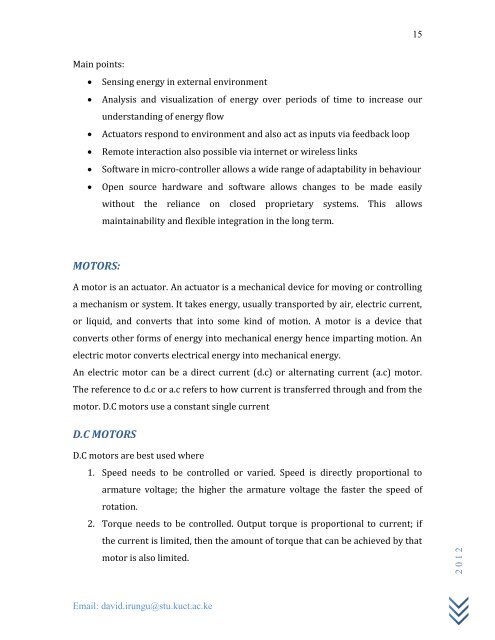SOLAR PV CONTROL SYSTEM.pdf
Create successful ePaper yourself
Turn your PDF publications into a flip-book with our unique Google optimized e-Paper software.
Main points:<br />
Sensing energy in external environment<br />
Analysis and visualization of energy over periods of time to increase our<br />
understanding of energy flow<br />
Actuators respond to environment and also act as inputs via feedback loop<br />
Remote interaction also possible via internet or wireless links<br />
Software in micro-controller allows a wide range of adaptability in behaviour<br />
Open source hardware and software allows changes to be made easily<br />
MOTORS:<br />
without the reliance on closed proprietary systems. This allows<br />
maintainability and flexible integration in the long term.<br />
A motor is an actuator. An actuator is a mechanical device for moving or controlling<br />
a mechanism or system. It takes energy, usually transported by air, electric current,<br />
or liquid, and converts that into some kind of motion. A motor is a device that<br />
converts other forms of energy into mechanical energy hence imparting motion. An<br />
electric motor converts electrical energy into mechanical energy.<br />
An electric motor can be a direct current (d.c) or alternating current (a.c) motor.<br />
The reference to d.c or a.c refers to how current is transferred through and from the<br />
motor. D.C motors use a constant single current<br />
D.C MOTORS<br />
D.C motors are best used where<br />
1. Speed needs to be controlled or varied. Speed is directly proportional to<br />
armature voltage; the higher the armature voltage the faster the speed of<br />
rotation.<br />
2. Torque needs to be controlled. Output torque is proportional to current; if<br />
the current is limited, then the amount of torque that can be achieved by that<br />
motor is also limited.<br />
Email: david.irungu@stu.kuct.ac.ke<br />
15<br />
2012



